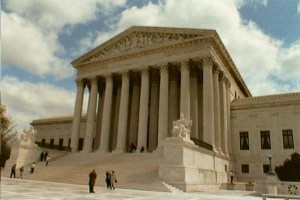Cert. Grant: Do Prisoners Have a Right to Use New Technology To Prove Their Innocence?
 The Supreme Court today granted certiorari in District Attorney’s Office v. Osborne (No. 08-6, opinion below: 521 F.3d 1118 (9th Cir. 2008)). At issue is whether a prisoner convicted of rape can sue a prosecutor’s office to obtain DNA evidence for more sophisticated testing than was available at the time of the prisoner’s trial. Lurking in the background is the difficult constitutional question of whether the prisoner would be entitled to obtain his release through a federal habeas corpus petition if DNA testing proved his innocence. The Supreme Court has repeatedly dodged this issue in the past, refusing squarely to hold whether or not innocent prisoners have a constitutional right to be relieved from their punishment under the Due Process Clause. See, e.g., House v. Bell, 547 U.S. 518 (2006).
The Supreme Court today granted certiorari in District Attorney’s Office v. Osborne (No. 08-6, opinion below: 521 F.3d 1118 (9th Cir. 2008)). At issue is whether a prisoner convicted of rape can sue a prosecutor’s office to obtain DNA evidence for more sophisticated testing than was available at the time of the prisoner’s trial. Lurking in the background is the difficult constitutional question of whether the prisoner would be entitled to obtain his release through a federal habeas corpus petition if DNA testing proved his innocence. The Supreme Court has repeatedly dodged this issue in the past, refusing squarely to hold whether or not innocent prisoners have a constitutional right to be relieved from their punishment under the Due Process Clause. See, e.g., House v. Bell, 547 U.S. 518 (2006).
The formalists on the Court have a hard time swallowing any constitutional rights that are not spelled out in explicit detail in the text of the Constitution, but I’ve always thought that “due process,” if it is to mean anything at all, must surely include a right not to be punished if one is not guilty. I think most Americans would be shocked to learn that the state may simply ignore persuasive evidence of innocence and continue to hold a prisoner for years (or potentially even execute the prisoner) despite grave doubts as to the prisoner’s guilt. New forensics technology (especially DNA testing) will eventually force the courts to tell us once and for all whether that is indeed the state of the law.


